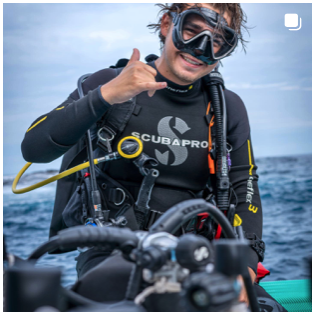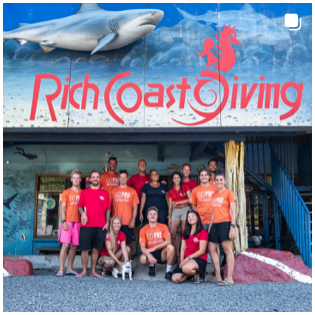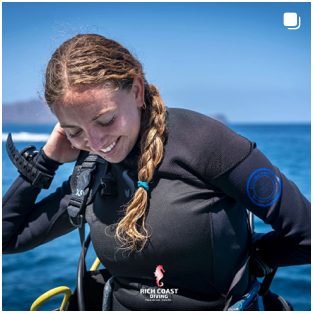Doing your PADI Advanced Open Water Course in Costa Rica
- Rich Coast Diving

- Apr 24, 2024
- 8 min read
Updated: Sep 24, 2025
Costa Rica is a great place to become and Advanced Open Water Diver. With a wide range of shallow and deep training sites full of marine life we help divers taking their next step in their scuba training.
Looking at the certification levels, the Advanced Open Water Course marks the next phase in your scuba journey, following the Open Water certification. Before you dive in, it's essential to conduct some research to understand what this course entails. We're here to assist by addressing any questions you may have about the Advanced Open Water Course.

1. Introduction to the PADI Advanced Open Water Course
While the Open Water Course taught you the fundamental skills of scuba diving, this course takes it a step further. You'll refine your abilities and cultivate the mindset and instincts of a seasoned diver. It's an opportunity to broaden your experience, advance your diving knowledge, and explore various scuba specialties under the guidance of an instructor.
The PADI Advanced Open Water Course comprises 5 adventure dives. Each adventure dive serves as an introduction to a specific specialty area. Given the array of PADI specialty courses available, the Advanced Course offers a glimpse into the diverse range of diving experiences awaiting you.
Here at Rich Coast Diving we have access to a wide range of dive sites right on our doorstep that offer great possibilities for training. Our experienced and multilingual instructors are looking forward to continue your training with you ! So let's see what the PADI advanced course is all about.
2. Why should you get Advanced Open Water certified ?
In essence, the Advanced Open Water course broadens your diving horizons, hones your skills, and serves as the next rung for those looking to continue their diving education. However, it's crucial to understand that despite its "Advanced" designation, completing the course doesn't automatically equate to being an experienced diver.
Upon achieving the PADI Advanced Open Water Diver certification, you gain the ability to explore greater depths. With certification to dive up to 30m / 100ft, a wide range of dive sites and marine life become accessible to you. Deeper depths often unveil marine creatures unseen at shallower levels, and wrecks frequently lie beyond the maximum depth of 18m / 60ft permitted by your Open Water Certification.
The Advanced certification is required for diving in locations with deeper dive sites, strong currents or other more challenging conditions. Liveaboards for example often require Advanced Diver certification. So if you are planning your next diving holiday. Check the local certification requirements and come prepared in order to avoid disappointment.

3. What are the prerequisites for the PADI Advanced Open Water Course ?
You don't have to be an experienced diver to enroll in this course; all you need is your Open Water Certification. And there is no minimum amount of dives required with PADI to start this course. The Open Water Course equips you with the fundamental skills necessary to progress to the Advanced Course. Many students transition directly from Open Water to Advanced Open Water.
What about the young divers that want to continue their training ? PADI Junior Open Water Divers aged 12 and above can also join an Advanced Open Water Diver course, with certain restrictions. Upon completing the Advanced Course, they'll be certified to dive up to 21m / 70ft, with an automatic upgrade to 30m/100ft when they reach 15 years of age.

4. What skills do you learn in the Advanced Open Water training ?
Completing the Advanced Open Water Course is relatively straightforward. First we send you the eLearning that you can complete at your own convenience before coming to Costa Rica. That way you spend more time diving and don't need to worry about doing any reading on your holidays. Most adventure dives do not involve any pool sessions so most training dives are in the ocean. This course comprises 5 distinct adventure dives. For each dive, you'll need to review relevant knowledge, which your instructor will discuss with you before heading into the water. The course can typically be completed over 2 or 3 days, with the possibility of doing up to 3 dives in a single day.
Among the five required training dives, both the Deep Dive and Underwater Navigation Dive are mandatory.
Deep Adventure Dive
Before the dive begins, you'll delve into the science of how conditions change at depth. And how this can affectThis encompasses both physical effects and cognitive performance. While the theoretical aspect is kept to a necessary minimum, it's crucial for you to comprehend the significant variances between diving at 18 meters and 30 meters.
Once underwater, you'll witness firsthand how things behave at 30 meters, often through demonstrations involving items of different materials. Additionally, you'll be tasked with a some fun activities to ensure your mental acuity remains intact. Typically, this involves answering a few questions or solving a straightforward puzzle. These activities usually take place early in the dive, shortly after safely reaching the required depth and often while kneeling on the sandy seabed. Once these tasks are completed, the remainder of your dive is akin to a regular recreational dive, where you can immerse yourself in the beauty of the reef and marine life of our favorite local dive site named "Sorpresa"

Underwater Navigation Adventure Dive
Underwater navigation primarily aims to ensure your safe return to the boat, shore, or designated exit point. Effective navigation techniques also optimize your dive plan, allowing you to reach your desired destinations efficiently without wasting time or energy searching. You'll begin by practicing compass navigation skills on land before honing them underwater, using kick cycles, visual landmarks, and time.
You don't need to feel nervous about the navigation dive as your experienced instructor will practice the skills with you on land first. And if you are diving often then consider purchasing your own compass, a valuable piece of equipment !
5. Which PADI Adventure Dives can I choose as part of my Course ?
The Advanced Open Water Diver course is all about advancing your skills. You'll practice navigation and buoyancy, try deep diving and make three specialty dives of your choosing. For every specialty dive you complete, you can earn credit toward PADI specialty certifications.
Here are a few of the many options:
Peak Performance Buoyancy
Night Diving
Wreck Diving
Drift Diving
Underwater Photography
Fish Identification
Search and Recovery
You find a full overview of the specialties we offer here at Rich Coast Diving on our website.
6. Which PADI Adventure dives do you recommend ?
Peak Performance Buoyancy is consistently the top recommendation from instructors. It helps you to improve your buoyancy, reduce your air consumption and be a better diver that does not disturb the environment while diving. Especially helpful if you are interested in underwater photography or video. This training dive delves deep into understanding buoyancy and teaches techniques to master it effectively. It's not only informative but also enjoyable, with courses often featuring obstacles like hoops and rings for divers to navigate through in a course-like setup. This course truly is a lot of fun !
Night Diving, although diving in the dark may initially instill nervousness, it often transforms into a beloved activity for most divers! Night dives offer the opportunity to encounter nocturnal sea creatures that are elusive during the day and see types of behavior you don’t see during your day dives.
Additionally, you have the chance to witness bioluminescence, where tiny plankton-like organisms emit a mesmerizing glow when disturbed. This natural phenomenon, akin to fireflies, creates a beautiful and captivating underwater spectacle.
Among students, popular choices include Wreck Diving, Photography, and Fish ID.

Wreck Diving, wrecks, a favored option among students, hold a captivating allure for exploration and are typically brimming with marine biodiversity. Whether intentionally sunk or lost in mishaps, ships, aircraft, and other submerged structures offer divers a rewarding and adventurous experience. While penetration of wrecks isn't permitted during this training dive, you'll gain valuable insights into the hazards and safety protocols of wreck diving. Additionally, you'll learn finning techniques to minimize sediment disturbance and protect marine life—a skill highly valued by your dive buddies!
Underwater photography, this dive provides a foundational understanding of creating stunning underwater shots. You'll learn camera operation techniques suitable for this environment, along with finning techniques and buoyancy control practices essential for achieving the perfect shot. Moreover, you'll cultivate the art of slowing down and meticulously examining the dive site.
It's an excellent opportunity to hone your skills in locating and identifying marine life. While this dive is popular among students, it may not be the optimal choice for beginners. If buoyancy control poses a challenge, incorporating a camera could exacerbate the difficulty by diverting your focus from your surroundings. Always prioritize diving within your proficiency level.

Harlequin shrimp are great subjects for underwater photography.
Fish Identification; learning about the marine life and underwater ecosystems can greatly enhance the diving experience. It transforms what might initially seem like a beautiful but mysterious environment into a fascinating world with its own unique inhabitants and dynamics.
Understanding the names, behaviors, and interactions of the creatures you encounter adds depth to each dive, allowing you to appreciate the intricacies of the underwater world in a whole new way. Plus, the more you know, the more you'll notice and appreciate during your dives, making each one even more enriching and memorable.

7. How do you choose the best Adventure Dives ?
Choosing the right adventure dives and courses is indeed crucial for tailoring your diving skills to your environment and future diving aspirations.
Considering the environment where you'll be diving is key. For instance, if you anticipate diving mainly in cold water locations, investing in a dry suit course would be wise to ensure comfort and safety in those conditions.
Exploring different specialties like Nitrox during an Advanced Open Water Course can offer a glimpse into the possibilities without a full commitment. This allows you to gauge your interest and see if it aligns with your diving goals before delving deeper into the subject.
Ultimately, the Advanced Open Water Course is a fantastic opportunity to not only enhance your diving skills but also to broaden your diving horizons. It's a chance to explore various aspects of diving while focusing on improving your abilities, making it an enriching and rewarding experience for any diver.
8. What Equipment do you Need ?
It's important to be prepared with the right equipment for the specific dives you choose, as it can greatly enhance your diving experience and safety. Depending on the nature of your chosen dives, you may need additional gear beyond your standard dive equipment.
For instance, if you opt for underwater photography dives, you'll need appropriate camera equipment. And for this adventure dive it is great if you better get to understand you own camera and how to make the best settings as each camera is different. If you're planning drift dives, a surface marker buoy (DSMB) can be essential for signaling your location to the boat above, especially if you are planning to continue your diver career the DSMB is a mandatory piece of equipment. For night dives, a dive light becomes indispensable for navigating and observing nocturnal marine life.
Moreover, for the mandatory navigational dive, having a reliable underwater compass is crucial, and investing in your first dive computer can greatly enhance your diving efficiency and safety by providing real-time dive data.
Fortunately, we provide all the necessary gear for training purposes, ensuring that you have access to the equipment you need to learn and practice effectively. This allows you to familiarize yourself with various diving equipment and techniques under the guidance of our experienced instructors, setting you up for safe and enjoyable diving adventures in the future.

If you want to know more about the PADI Advanced Open Water Diver Course in Costa Rica then our staff is ready to help you taking the first steps. Contact us for more information at:
Rich Coast Diving
Mrs. Céline Monfort
Email: info@richcoastdiving.com
WhatsApp +506 8449 4217


















Comments